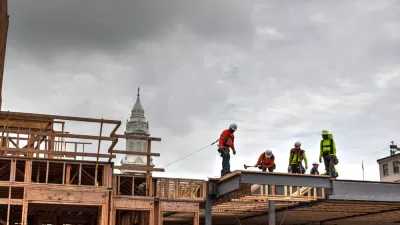Mixed-income housing - infusing affordable housing with market-rate units - is relying more on incentives and subsidies, than mandates, to stimulate development.
Thankfully, dwindling are the days of segregating low-income residents into affordable housing-only enclaves. Today, the need for affordable housing remains, yet an emerging trend is to utilize public incentives to co-mingle income groups in mixed-housing developments.
"The concept is finding favor among for-profit and nonprofit developers alike, particularly in today's tight lending market," states Patricia Kirk of Urban Land Magazine, "because local governments offer a number of incentives, including low-interest financing tools, cash subsidies and grants, free or low-cost land, density bonuses, tax abatement programs, rehabilitation assistance, fast-tracking of plan reviews and permits, and reduced or waived fees." It is these incentives that are driving private developers to include affordable housing in their developments, sometimes mixing affordable units with multi-million dollar ones.
While city planners and some developers state that it's simply "the right thing to do," many cities have been banned from mandating the inclusion of affordable housing into development plans by state statutes. In turn, cities are now looking at the use of incentives to coax developers into voluntarily setting aside up to 20 percent of their units as affordable housing.
For example, "Austin's S.M.A.R.T. (Safe, Mixed-income, Accessible, Reasonably priced, Transit-oriented) Housing Program offers developers a schedule of incentives based on the level of affordable housing provided. The city provides additional density and height variance, or floor/area ratio, to encourage provision of affordable housing and other community benefits, such as parking, open space, and streetscapes." Other cities like Los Angeles, New York and Portland have used similar incentive strategies to construct new transit-oriented developments, senior housing, art colonies and help revitalize economically and environmentally distressed neighborhoods.
FULL STORY: Making Mixed-Income Housing Work

Maui's Vacation Rental Debate Turns Ugly
Verbal attacks, misinformation campaigns and fistfights plague a high-stakes debate to convert thousands of vacation rentals into long-term housing.

Planetizen Federal Action Tracker
A weekly monitor of how Trump’s orders and actions are impacting planners and planning in America.

Chicago’s Ghost Rails
Just beneath the surface of the modern city lie the remnants of its expansive early 20th-century streetcar system.

Bend, Oregon Zoning Reforms Prioritize Small-Scale Housing
The city altered its zoning code to allow multi-family housing and eliminated parking mandates citywide.

Amtrak Cutting Jobs, Funding to High-Speed Rail
The agency plans to cut 10 percent of its workforce and has confirmed it will not fund new high-speed rail projects.

LA Denies Basic Services to Unhoused Residents
The city has repeatedly failed to respond to requests for trash pickup at encampment sites, and eliminated a program that provided mobile showers and toilets.
Urban Design for Planners 1: Software Tools
This six-course series explores essential urban design concepts using open source software and equips planners with the tools they need to participate fully in the urban design process.
Planning for Universal Design
Learn the tools for implementing Universal Design in planning regulations.
planning NEXT
Appalachian Highlands Housing Partners
Mpact (founded as Rail~Volution)
City of Camden Redevelopment Agency
City of Astoria
City of Portland
City of Laramie





























